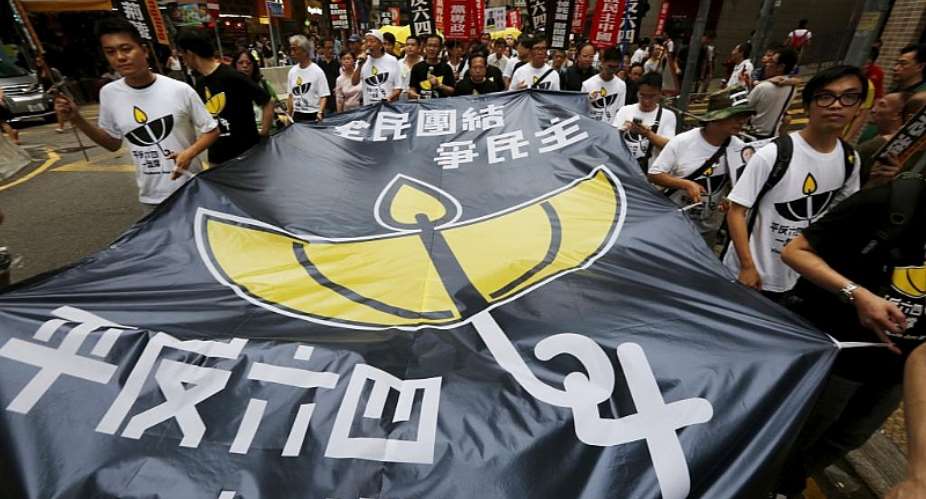In a trial that is bound to heighten tensions between Hong Kong's population and Beijing, three leading democracy campaigners have pleaded not guilty over their involvement in “attempts to breach peace” during “unlawful assemblies.”
The pioneering trio are among nine activists all facing public nuisance charges for their participation in the 2014 Umbrella Movement protests.
Sociology professor Chan Kin-man, 59, law professor Benny Tai, 54, and Baptist minister Chu Yiu-ming, 74, founded the Occupy Central with Love and Peace movement in 2013 and joined with the student-led “Umbrella Movement” which brought parts of the city to a standstill for months, calling for free elections for the city's leader.
The charges the trio face are based on colonial-era law and carry jail terms of up to seven years.
Under Article 18 (1) of Part IV of the Hong Kong Public Order Ordinance , when three persons, assembled together ... provoke other persons to commit a breach of the peace,” the gathering is “unlawful.”
Punishment can be up to 5 years imprisonment. If the assembly degenerates into a “riot,” participant can expect prison terms up to 10 years.
Ironically, this legislature was first passed into law in 1967 by the British Hong Kong government to allow it to deal with Beijing- inspired riots by left wing groups.
“Those laws are very obsolete,” says Claudia Moh, Legco member for the Civic Party contacted by RFI.
Legco is the legislative council of Hong Kong.
“They are so old fashioned, that they have been scrapped in Australia. It is along the lines of 'inciting others to incite others,' what are you talking about?” she asks.
What Is The Umbrella Movement
The Occupy Central and Umbrella Movements were an expression of Hong Kong citizens' general disappointment with the local government and the leadership in Beijing.
“They promised universal suffrage. That means: one man, one vote. But then they decided to screen the candidates who want to run in the elections for the position of Chief Secretary of Hong Kong,” says Moh.
“But this sort of pre-screening is completely undemocratic. The people should have their own choice. If they like a particular candidate they vote for him. You don't tell them that one particular candidate is unsuitable,” she says.
Activists started to gather in front of Government House, demanding that the pre-screening be repealed. They were arrested. More people gathered in support of them, and the Occupy Central with Love and Peace was born.
“The police started to use tear gas and pepper spray, against the protesters. And we could only use umbrellas to stop the spray from attacking us. And with so many umbrellas hoisted, the name 'umbrella movement' was coined."
Historic Beijing problems
But disappointment with the government in Beijing goes back further than 2014.
In 1984, then leaders Margaret Thatcher, the British Prime Minister, and Zhao Ziyang, the Chinese Premier, signed the Joint Declaration , paving the way for the Hong Kong handover in 1997, which resulted in a hybrid system called “One Country, Two Systems,” where Hong Kong would become a semi-autonomous Special Administrative Region (SAR) with its own government, police, customs and currency. Universal suffrage was promised.
“At the time I was fairly optimistic. I thought: 'times are changing. We would only be progressing. We wouldn't go back. China was progressing at the time, with Deng Xiaoping's 'Open Door' policy.
The first major blow to Beijing's credibility came in June 1989, when the People's Liberation Army crushed peaceful protests on Tian'anmen Square, turning a tide of relative political liberty in mainland China into decades of repression.
Reform-minded leaders, including Zhao Ziyang and those sympathetic to them were accused of “splitting the Communist Party” and removed, demoted or jailed.
Hong Kong initially remained unaffected by the change of guard in Beijing, but slowly, its hard-line politics started to trickle trough.
The turning point came in 2007.
“Before 1997, a local reporter asked a Beijing official here in Hong Kong, when we can have universal suffrage. And he replied: 'ten years after the handover should be ok.
"But in 2007 I knew that things were not happening as they said they would be.”
In that year, Beijing issued an annex to the Hong Kong “Basic Law ,” that said that the Chief Executive, nor the members of Legco would be elected through universal suffrage.
“There was no universal suffrage in Hong Kong, no true democracy. That was the time that I felt completely disappointed.
“Things are getting worse and worse,” says Moh.
“But I still have hope. Otherwise I wouldn't be doing what I am doing. I might as well just retire and enjoy life, go travelling. But we are still fighting. We're not taking things by just lying down,” she says.





 Tuesday’s downpour destroys ceiling of Circuit Court '8' in Accra
Tuesday’s downpour destroys ceiling of Circuit Court '8' in Accra
 SOEs shouldn't compromise on ethical standards, accountability – Akufo-Addo
SOEs shouldn't compromise on ethical standards, accountability – Akufo-Addo
 Father of 2-year-old boy attacked by dog appeals for financial support
Father of 2-year-old boy attacked by dog appeals for financial support
 Jubilee House National Security Operative allegedly swindles businessman over sa...
Jubilee House National Security Operative allegedly swindles businessman over sa...
 Nobody can order dumsor timetable except Energy Minister – Osafo-Maafo
Nobody can order dumsor timetable except Energy Minister – Osafo-Maafo
 Mahama wishes National Chief Imam as he clock 105 years today
Mahama wishes National Chief Imam as he clock 105 years today
 J.B.Danquah Adu’s murder trial: Case adjourned to April 29
J.B.Danquah Adu’s murder trial: Case adjourned to April 29
 High Court issues arrest warrant for former MASLOC Boss
High Court issues arrest warrant for former MASLOC Boss
 Align academic curriculum with industry needs — Stanbic Bank Ghana CEO advocates
Align academic curriculum with industry needs — Stanbic Bank Ghana CEO advocates
 Election 2024: We'll declare the results and let Ghanaians know we've won - Manh...
Election 2024: We'll declare the results and let Ghanaians know we've won - Manh...
